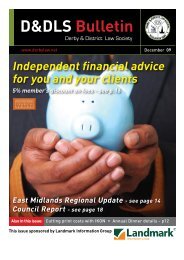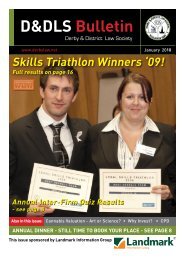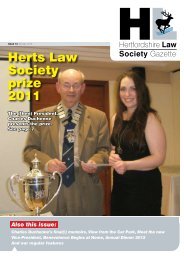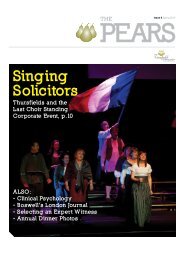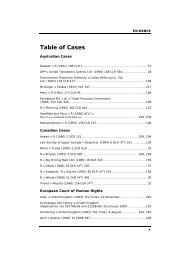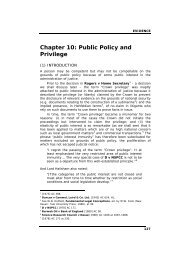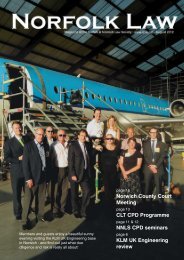Herts Law Society prizewinners 2012 - Insite Law Magazine
Herts Law Society prizewinners 2012 - Insite Law Magazine
Herts Law Society prizewinners 2012 - Insite Law Magazine
You also want an ePaper? Increase the reach of your titles
YUMPU automatically turns print PDFs into web optimized ePapers that Google loves.
EditorialFeatured ArticleThe Annual Lunch in the 6 ’s2013 will mark the 50th anniversaryof Hertfordshire <strong>Law</strong> <strong>Society</strong> PastPresident Graham Spittle attending hisfirst Hertfordshire <strong>Law</strong> <strong>Society</strong> AnnualLunch. Interrupting his series of articlesabout office life in the 60s, he stops toreflect on how the <strong>Society</strong>’s main socialevent of the year has changed since then.In 1963, nearly every Hertfordshire solicitor attended theannual lunch.Although the better managed firms left a partner to providesupervision and sign cheques, this was before <strong>Law</strong> <strong>Society</strong>rules specified how offices should be supervised, and manywere left in the hands of unadmitted staff from mid-morningon the 2nd Friday in June.No professional commitmentsClients were told the completion of conveyancing transactionswas impossible that day, although, with at least four weeksbetween exchange of contracts and completion and the fashionfor completing conveyancing transactions on a Friday not yetinvented, this actually caused little if any inconvenience toclients. Few magistrates’ courts and even fewer county courtssat every day of the week. Of the higher courts, quarter sessionsreally did only sit for a week or two every quarter and assizeseven less frequently. Clients invariably made appointments(often by letter) well in advance. It was extremely unluckyif professional commitments prevented attending the lunch.Dress was ordinary office suits (after a shortened morning’swork). It was not until the 80s that the event became a blacktie dinner.VenueThe venue was Harpenden Public Hall, because it wasroughly central within the county and well served by busesand trains. Car ownership in those days did not even extendto all partners let alone all solicitors.Tickets were restricted to full members and one guest each.Firms hastened their newly qualified solicitors to join the<strong>Society</strong> in order to qualify for an additional guest ticket, andbe able to invite as many of the other influential businessmenin their area as possible before rival firms invited them. A fewyears later the event moved to Watford Town Hall as the onlyvenue big enough. The distance did not deter firms from theother side of the county from attending.GuestsMost firms invited their bank manager to ensure continuationof the firm’s banking facilities. In those days the local bankmanager was a man of enormous power and influence likeCaptain Mainwaring in the television series “Dad’s Army”. Itshould be remembered that in 1963 the period in which thatprogramme was set was only a little over 20 years before.The firm’s accountant was also frequently invited;entertainment in those days being wholly tax-deductible.Estate agents were also among the guests. In the days beforereferral fees, an invitation to the annual lunch was one ofthe few legitimate ways of attracting recommendations fromestate agents. The local building society branch manager(often another captain Mainwaring figure) was invited, togive the firm some influence in securing mortgages for theirclients. Obtaining a mortgage normally required the savingof a 10% deposit with the building society concerned first,and at a monthly rate equivalent to the anticipated monthlyrepayments. Interest only mortgages backed by an endowmentpolicy did not become common until later in the decade.Top tableThe society’s official guests on the top table included manyof the mayors of boroughs within the county and chairmen ofurban and rural district councils (before these were abolishedby the 1974 Act) as well as the chairman of the County Counciland the Chief Constable. The society also invited all articledclerks (as trainees were called in those days), although laterin the 60s they were restricted to articled clerks in their firstand last years, which probably discriminated against nongraduatesserving five years as articled clerks, but nobodyworried about discrimination in those days.MenuBefore the meal, there was a choice of sweet or dry sherryas an aperitif. For as long as anyone could remember, themenu had been a small portion of salmon salad as a starter(then called “hors d’oeuvres”), cold chicken salad with hotnew potatoes for the main course followed by strawberriesand cream. As far as I can remember, this continued until theannual lunch morphed into an annual dinner. I am not sureabout vegetarian options. I think the few vegetarians presentjust left the chicken. Coffee followed: either black or with thecream provided. Nobody worried about high cholesterol inthose days.No entertainmentApart from speeches, and there was no entertainment exceptfor regular announcements of the latest test score obtained bydialling UMP from a coinbox telephone at a cost of 4 (predecimalisation)pence. There was no music: either live orrecorded.After the loyal toast, nearly everyone smoked and cigars wereprovided on the table. Similarly nearly everyone consumedthe ruby port provided, and/or purchased liqueurs duringthe speeches. This was before the 1967 Act introducing thebreathalyser, and there was a superstition that the presence ofthe Chief Constable (see above) would ensure immunity fromprosecution for drunken driving.ToastsThe to reply to the toast to “Our Guests” was given by agenuine guest, rather than a paid speaker. I can remembersome very entertaining speeches by the Bishop of St Albansor one of his suffragans, who were usually present to sayGrace, although rather overqualified to do so.The toast to “The New Solicitors” was announced asa toast to “The New Men”, for the simple reason that allsolicitors were men. In fact, nearly all the guests were mentoo.Table decorationsThe tables were decorated with a vase of carnations,which traditionally were divided up at the end and eitherworn as buttonholes, or taken back to ones secretary as athank you for doing all the work back at the office. Onecarnation for a day’s work. Simple pleasures.I cannot comment on what other pleasures may havefollowed the consuming of so much intoxicating liquor, buttea was served before departure to make certain no-one gotback to his office much before closing time, and this probablyenabled most of the female staff to get off home first.This was all many years before the <strong>Society</strong> engaged theservices of an administrator, and the whole event wasorganised by the Hon. Secretary with the blessing of hisfirm, who also made clerical staff available to help him.Nobody worried about billable hours. Happy days.Next time: COURT WORK IN THE 60s.Have you said ‘Thank You’ today?The Editor felt the following Article from the “<strong>Law</strong>Care Summer <strong>2012</strong> News” e-mail circular should be widely read. The Author has kindlygiven permission to reproduce it under a statement that the article first appeared in Managing Partner magazine.by Jill King, former HR Director, LinklatersEmployee engagement is big business these days. And it’s atop priority for most firms, conscious of the demands theyplace on their associates at a time when promotion prospects areat all all-time low.In response to this issue, there has been a proliferation of staffsurveys and expensive partner training programmes. But, inmy experience, it’s the little things that make the big difference;not exactly random acts of kindness but spontaneous acts ofappreciation.Rather than focussing on ways to motivate associates, my beliefis that firms and their partners should focus on avoiding demotivatingtheir associates - it’s about the things you don’t do,rather than the things you do.Most professionals are naturally self-motivated. They setthemselves high standards, want to do their very best andthrive on challenge and success. So, while it’s tempting to pushperformance to even higher standards, understanding howeasily that natural self-motivation can be destroyed is a muchmore fruitful lesson.When you have worked long hard hours, overcome difficultiesand made personal sacrifices to achieve results, it is souldestroyingthat no one has noticed or appreciated your efforts.By contrast, small personal touches and acts of thoughtfulnesscan build loyalty and renew energy in an instant.I remember a newly-elected partner telling me a story of whenshe was a trainee. In the early hours of the morning, in themidst of a gruelling transaction, a senior partner offered tocomplete the document review she was working on and madeher a cup of tea. All those years later she had never forgottenhow appreciated that made her feel, and she was determined toapply the same thoughtfulness to her own team members.Noticing when associates have gone out of their way to completea matter with a thank you and a smile goes a long way, as doesputting your head around each associate’s door as you leave thebuilding to see how they are doing.Remembering when an associate has an important event that heneeds to leave on time for and buying cakes or drinks when thegoing gets tough are the ways great leaders motivate others andcreate great esprit de corps. A bunch of daffodils on the desk ora grateful voicemail message is all it takes for most of us to pickourselves up and want to achieve even greater things as part ofa team.It’s infectious once you start - and nothing is more rewardingthan know that you have made someone’s day.▲ 12Hertfordshire <strong>Law</strong> <strong>Society</strong> Gazettehttp://www.hertslawsoc.org.uk/13 ▲



